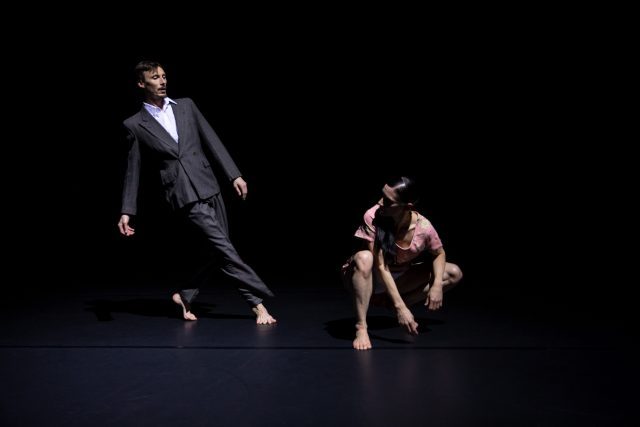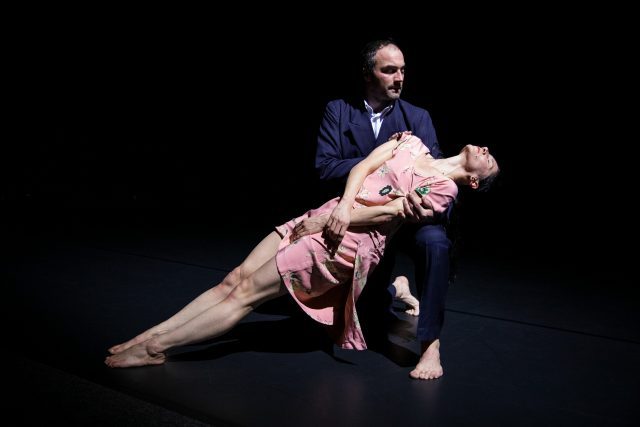
Cynthia Loemij and Igor Shyshko have a brief encounter in Anne Teresa De Keersmaeker’s Verklärte Nacht (photo by Maria Baranova)
Baryshnikov Arts Center, Jerome Robbins Theater
450 West 37th St. between Ninth & Tenth Aves.
January 30 – February 3, $20-$25
866-811-4111
bacnyc.org
www.rosas.be/en
Anne Teresa De Keersmaeker’s 2014 streamlined version of Verklärte Nacht (“Transfigured Night”), originally an ensemble piece from 1995, is making its New York debut this week, continuing at the Baryshnikov Arts Center’s Jerome Robbins Theater through February 3. The short but powerful forty-minute work from the Belgian choreographer’s Rosas company is inspired by German Symbolist Richard Dehmel’s 1896 poem, which itself inspired Austrian American composer Arnold Schönberg’s romantic 1899 program music (op. 4) for string sextet. Dehmel’s short poem is about a woman who decides to become a single mother, having sex with a stranger. However, after she is pregnant, she unexpectedly falls in love with another man but has to tell him that she is carrying someone else’s child. In the poem, the specific text of which is not in the show, she opines, “I am carrying a child, and not yours; / I walk in sin beside you. / I have deeply sinned against myself. / I no longer believed in happiness / And yet was full of longing / For a life with meaning, for the joy / And duty of maternity; so I dared / And, quaking, let my sex / Be taken by a stranger, / And was blessed by it. / Now life has taken its revenge, / For now I have met you, yes you.” In a piece that was initially rejected by program committees and the public, Schönberg brings to life the emotions ripping through the woman’s soul as well as the man’s. (De Keersmaeker uses a lovely recording by Pierre Boulez and the New York Philharmonic.)

Boštjan Antončič holds up Cynthia Loemij in emotional work at Baryshnikov Arts Center (photo by Maria Baranova)
The dance takes place in a stark black box theater with no accoutrements whatsoever. (The spare lighting is by De Keersmaeker and Luc Schaltin.) The opening is rendered in silence, as Cynthia Loemij (the woman) engages with Igor Shyshko (the stranger). Once the music starts, Verklärte Nacht transforms into an epic expressionistic silent film as Loemij and Boštjan Antončič as her true love repeatedly come together and separate. She falls to the floor again and again, jumps on him with her knees on his shoulder, brings his head to her belly. He stands in the corner, looking away, then runs around the space, lifting and twirling her. On the ground, she motions as if giving birth, exhibiting the pain and loneliness she expects to experience once he ultimately rejects her. She’s in a loose-fitting flower-print dress, a sign of spring and rebirth though muted, while he is in a dark suit and white shirt; both are barefoot. (The costumes are by Rosas and Rudy Sabounghi.) In some ways it is a feminist reinterpretation of thebiblical story of the Garden of Eden; the woman took a bite of a stranger’s fruit and now must face the consequences after being cast out of paradise, but Dehmel, Schönberg, and De Keersmaeker (A Love Supreme, Six Brandenburg Concertos) offer a touching finale. Although its operatic scope may feel a bit dated, the performers’ total mastery of the material and Loemij’s brilliant dancing continue to make the piece involving and compelling.